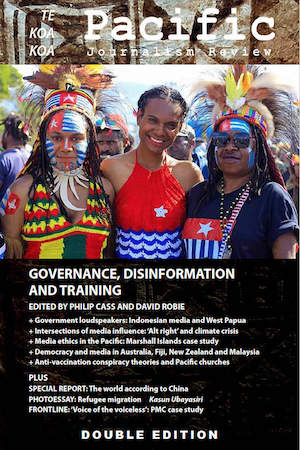By Kelvin Anthony
News media in Indonesia act as “government loudspeakers” by advancing a one-sided narrative regarding the conflict in West Papua, a new study reveals.
The human rights abuses against indigenous Papuans, who have been under military occupation of the Indonesian armed forces since 1962-63 and their struggle for independence from Jakarta, remains a sticking point for the Indonesian government in the region.
However, the Indonesian national media provides an unfair coverage on the plight of the West Papuans by only amplifying the state’s narrative, according to research published in Pacific Journalism Review.

The paper, which looks at how six dominant news media organisations in Indonesia report on the Free West Papua movement, found that they “tend to be only a ‘loudspeaker’ for the government” by using mainly statements issued by state officials when reporting about West Papua.
The findings come from in-depth interviews that were conducted between 2021 and 2022 with six informants and journalists who have a history of writing on West Papua in the last five years.
Additionally, the research analysed over 270 news items relating to West Papua issues that appeared in the six Indonesian online media — Okezone, Detik, Kompas.com, Tribunnews, CNN Indonesia and Tirto — in the week after the Indonesian government formally labelled the armed wing of the Free Papua Movement (TPNPB-OPM) as a terrorist group in April 2021.
“The Indonesian media does not use a balanced frame, for example, in terms of explaining why and how acts of violence are chosen on the path to fight for West Papuan independence,” the author of the research from Universitas Padjadjaran, Justito Adipresto, writes.
‘Prolonging human rights violations’
Non-state actors have acknowledged that “labelling West Papuan separatist groups as terrorist will not only not solve the problem, but that it also has the potential to prolong the human rights violations that have been taking place in West Papua,” Adipresto says.
While some point to the economic disparities as a starting point to the West Papua conflict, the research shows that the media fall significantly short of providing a nuanced coverage by ignoring the “haunting track record of violence and militarism, ethnicity and racism” in their reports.
“The imbalance of representation that occurs in relation to reporting on West Papua cannot be separated from Indonesia’s treatment of ethnic groups and the region of West Papua,” Adipresto says.
He says the government’s labelling of the Free West Papua movement has “severe implications for the current and future situation and conflict in West Papua”.
“Media in Indonesia is under the shadow of the state,” he said adding that reporting on West Papua lacks “explanation and sufficient context”.
He said Indonesian media were “very concerned about the readers clicks”, and therefore on the quantity of reports rather than the quality.
“The concentration of reporters in the Indonesian capital, Jakarta, also leads to reporting from reporters not located in or never having visited West Papua, potentially reducing empathy and understanding of human rights or economic aspects in their reporting.
‘Quality, ethics of journalists are an issue’
“The quality and ethics of journalists are an issue in reporting on West Papua, considering that journalists do not tend to cover the issue of labelling a ‘terrorist’ comprehensively.”
The research shows Indonesian media place greater importance on comments from government officials, often ignoring or not providing space for other voices, in particular the West Papuan community.
“It is necessary to develop a more systematic and consolidated strategy for the national media to cover West Papua better,” the author concludes.
Kelvin Anthony is an RNZ Pacific lead digital and social media journalist. The full paper, titled “Government loudspeakers: How Indonesian media amplifies the state’s narrative towards the Free West Papua movement”, can be found at Pacific Journalism Review, published by the Asia Pacific Media Network. This article is republished under a community partnership agreement with RNZ and Asia Pacific Report.

